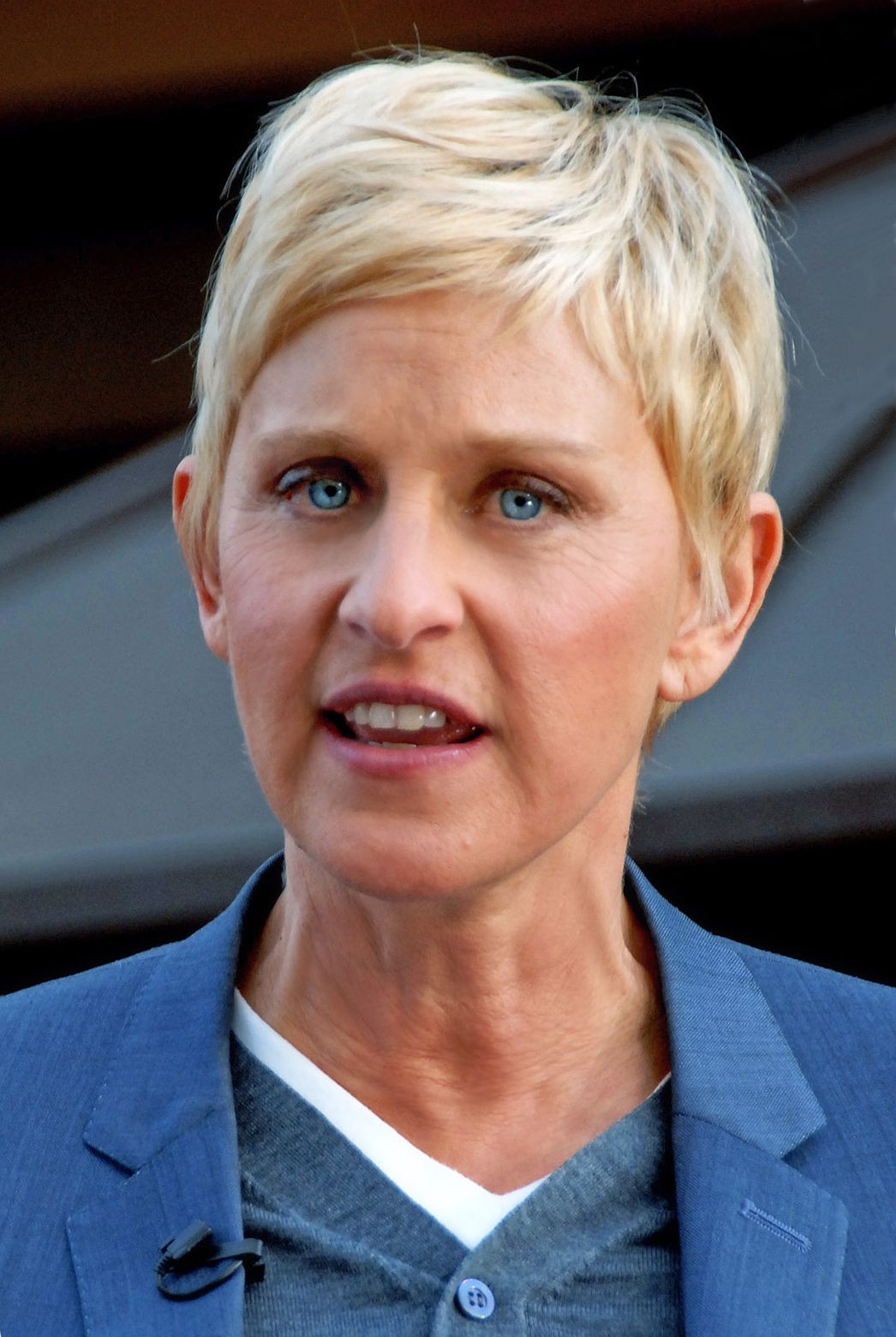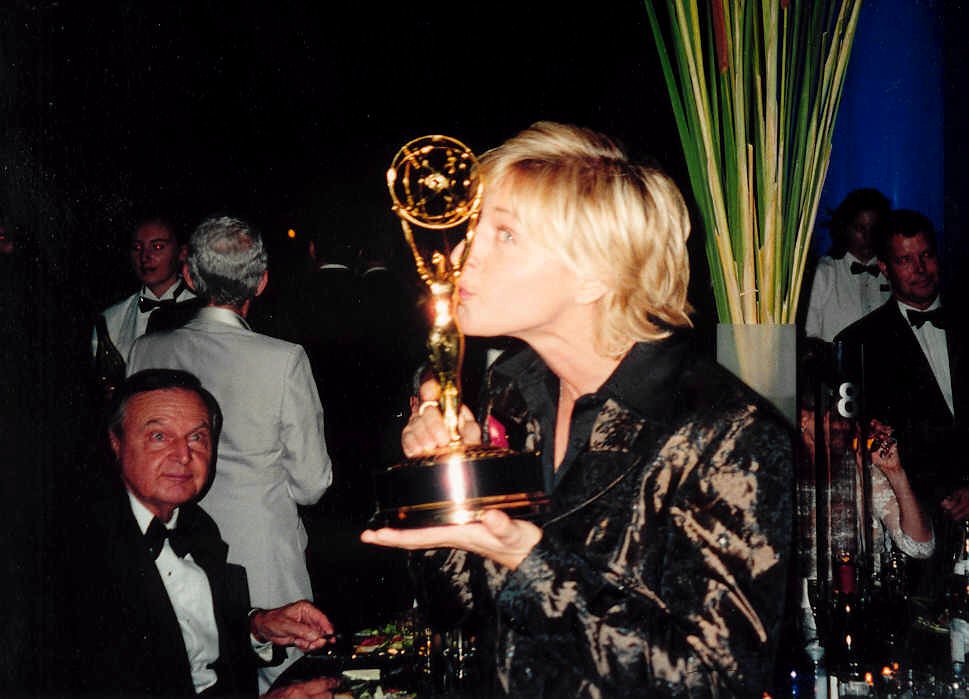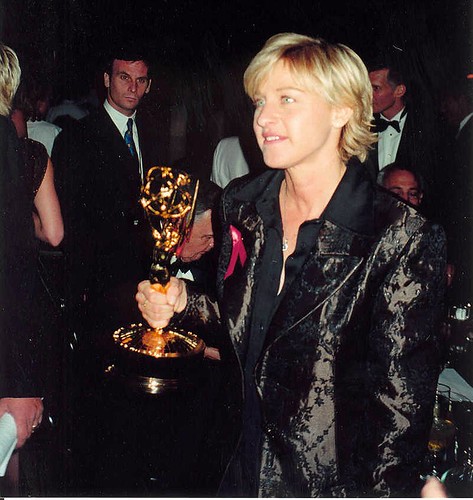
Ellen DeGeneres, once a symbol of warmth, laughter, and boundless charm, spent decades captivating audiences across the world. Her journey from stand-up comedy clubs to becoming one of the most influential figures in American entertainment remains a powerful testament to her distinct comedic talent and commanding presence. For years, her public image as the endlessly cheerful and gracious host of The Ellen DeGeneres Show appeared untouchable, earning her numerous prestigious awards and the enduring admiration of millions.
She established a unique and influential presence in daytime television, consistently promoting kindness and fostering an uplifting atmosphere that deeply resonated with her audience. This carefully cultivated persona, widely embraced by viewers and industry peers alike, began to face growing scrutiny, gradually exposing a more complex reality behind the polished façade. As her success reached unprecedented heights, it also created the conditions for a significant reassessment of her professional environment and conduct.
This article examines Ellen DeGeneres’ multifaceted career, tracing her rise to cultural prominence and the pivotal milestones that shaped her public identity. It also explores the sequence of events that contributed to her widely discussed public reckoning. By delving into the layers of her professional and personal narrative, we aim to present a fuller understanding of the forces that shaped, sustained, and ultimately challenged her standing in the public eye.

Humble Beginnings and Early Influences
Born Ellen Lee DeGeneres on January 26, 1958, in Metairie, Louisiana, her early life provided foundational experiences that would later subtly surface in her distinctive comedic work. Her mother, Elizabeth Jane “Betty,” was a speech therapist, and her father, Elliott Everett DeGeneres, an insurance agent. Raised a Christian Scientist alongside her brother Vance, Ellen’s childhood saw the separation of her parents in 1973 and their divorce the following year.
A particularly challenging period involved moving with her mother and stepfather, Roy Gruessendorf, from New Orleans to Atlanta, Texas, while Vance stayed with their father. Tragically, DeGeneres endured profound personal trauma when she was molested by her stepfather at 15 or 16. Gruessendorf insidiously exploited her mother’s recent breast cancer diagnosis as a cruel pretext to touch her inappropriately, even attempting to break down her door to sexually assault her. This terrifying incident prompted her to flee home and seek refuge by spending the night in a hospital.
DeGeneres bravely confided in her mother about the disturbing abuse years later. Betty initially struggled to believe her daughter, remaining married to Gruessendorf for 18 years. Only much later, when his accounts of his behavior towards his stepdaughter began to shift, did her mother realize the truth. These formative, often difficult, experiences contributed to her unique humor and resilience. After high school and a brief stint at the University of New Orleans, DeGeneres took diverse early jobs—including clerical work, retail, waitressing, and house painting—all of which offered rich material for her future comedic narratives, allowing her to connect with audiences.

The Stand-Up Ascent: From Clubs to National Recognition
Ellen DeGeneres meticulously honed her craft in intimate comedy clubs and coffee houses, establishing herself as a burgeoning talent in stand-up. By 1981, her comedic prowess earned her the position of emcee at Clyde’s Comedy Club in New Orleans, a significant step. She cited Woody Allen and Steve Martin as her primary influences, absorbing their styles into her evolving comedic voice.
Her commitment to stand-up quickly paid off, as she commenced national touring in the early 1980s, expanding her reach. This exposure culminated in 1984 when she was named Showtime’s “funniest person in America,” a prestigious recognition that firmly cemented her status as a rising star. This early success vividly demonstrated her profound ability to connect with audiences through humor, setting the stage for her eventual transition to television.
Despite mainstream success, DeGeneres maintained a deep connection to her stand-up roots. She returned after a 15-year hiatus for her 2018 Netflix special, Relatable, playfully poking fun at her “kind” public image. She also announced another anticipated special, For Your Approval, released in September 2024, demonstrating her enduring commitment to the art form that first launched her career, even amidst the changing landscape of public perception.

Sitcom Stardom: The Phenomenon of Ellen
DeGeneres’s transition to the small screen began with smaller roles, including Open House (1989) and Laurie Hill (1992). However, her pivotal collaboration with producers Neal Marlens and Carol Black truly launched her into sitcom stardom. They cast her in their ABC pilot, These Friends of Mine, which, after its first season, was aptly renamed Ellen, centering the show around her unique comedic style.
The newly rebranded Ellen swiftly gained immense popularity during its initial seasons. This success was largely attributed to DeGeneres’s signature style of sharp observational humor, which drew favorable comparisons to Seinfeld. The show was frequently referred to as a “female Seinfeld,” a testament to its relatable comedic situations and character-driven narratives, and DeGeneres’s ability to extract humor from everyday life.
The sitcom served as a crucial platform for DeGeneres, solidifying her status as a mainstream television star. More importantly, it set the stage for one of the most significant and culturally impactful moments in television history. Her burgeoning fame and the established platform of Ellen provided the necessary visibility and cultural currency for her to make a profound personal and professional declaration that would ultimately transcend entertainment.

A Pivotal Moment: The Public Coming Out
April 1997 stands as an indelible and profoundly pivotal moment in both Ellen DeGeneres’s career and in television history, as she courageously and publicly came out as a lesbian. This unprecedented disclosure was announced on the cover of Time magazine with the simple yet powerful words: “Yep, I’m gay.” This candid revelation not only seized national headlines but also historically positioned DeGeneres as the first openly gay lead character on an American network television show, fundamentally shifting LGBTQ+ representation in mainstream media.
The far-reaching cultural impact of her coming out extended to her sitcom, Ellen, where, in a parallel storyline, her character also bravely came out to her therapist, a significant role played by Oprah Winfrey. This groundbreaking episode, famously titled “The Puppy Episode,” became one of the highest-rated installments of the show, drawing immense public attention and sparking widespread discussion. It was a moment that transcended entertainment, evolving into a powerful statement on identity, acceptance, and visibility.
While her public coming out was a monumental step forward, it also brought unforeseen and arduous challenges. The intense media scrutiny and contentious tabloid coverage that followed reportedly “stunted her professional career and left her ‘mired in depression’.” Despite these hurdles, this courageous act solidified her as a resilient LGBTQ+ icon, even as her sitcom’s ratings subsequently declined, leading to its cancellation after a pioneering yet challenging fifth season.

Success Beyond Sitcoms: Hollywood Roles and Dory’s Legacy
Beyond her acclaimed sitcom success, Ellen DeGeneres cultivated a notable film career, showcasing her versatile talents. Her early forays into film included a role in Coneheads. She also starred in films for “Ellen’s Energy Adventure” at Walt Disney World’s Epcot, an educational attraction featuring her alongside figures like Bill Nye. This blend of entertainment and information hinted at her broad appeal.
However, it was her iconic voice work as Dory in the 2003 animated Disney/Pixar film Finding Nemo that truly cemented her status as a beloved film figure. Dory, a friendly, optimistic, and endearingly forgetful fish with short-term memory loss, swiftly became one of animation’s most memorable characters, largely due to DeGeneres’s distinctive, warm, and utterly charming vocal performance. Director Andrew Stanton reportedly cast DeGeneres after observing her ability to change subjects five times within a single sentence, perfectly mirroring Dory’s nature.
Her brilliant portrayal of Dory garnered significant critical acclaim and prestigious awards, including a Saturn Award for Best Supporting Actress and an Annie Award for Outstanding Voice Acting. Such was the character’s impact that she triumphantly reprised the role in Finding Dory, the highly anticipated 2016 sequel. This consistent and celebrated film success ensured DeGeneres maintained a strong and beloved presence on the big screen, even as her dynamic television career continued to undergo significant transformations.

The Reign of The Ellen DeGeneres Show Begins
Following her earlier sitcom ventures, Ellen DeGeneres orchestrated a triumphant return to television, launching her syndicated daytime talk show, The Ellen DeGeneres Show, in September 2003. This marked the beginning of her most enduring and overwhelmingly successful professional undertaking, quickly distinguishing itself among a crowded field of celebrity-hosted talk shows that emerged around the same period.
The program rapidly gained substantial traction, consistently experiencing a significant rise in Nielsen ratings and accumulating widespread critical praise. In its inaugural season, it garnered an impressive 12 Daytime Emmy Award nominations, ultimately winning four, including the coveted Best Talk Show award. This early success firmly set the tone for what would become a dominant force in daytime television, earning 25 Emmy Awards within its first three seasons alone and establishing DeGeneres as a formidable, innovative, and deeply cherished talk show host.
For a significant portion of its remarkable run, The Ellen DeGeneres Show became indelibly synonymous with DeGeneres’s signature opening dance segments with her enthusiastic audience, and her famously generous giveaways of free prizes and exotic trips, often facilitated by sponsors. While these highly engaging elements contributed significantly to the show’s positive, feel-good atmosphere and its immense popularity, DeGeneres later admitted that the iconic dancing eventually evolved into an expectation and, at times, a considerable “burden.” This subtle admission hinted at the inherent pressures that came with meticulously maintaining such a widely adored public persona.

Becoming a Beloved Host: The Award Show Stage
Beyond her daily talk show, Ellen DeGeneres further solidified her status as a true mainstream entertainment figure through her recurring role as host of several major award ceremonies. Her ability to adeptly navigate complex tones and sensitive situations was particularly evident on November 4, 2001, when she hosted the Emmy Awards. This ceremony was presented after two cancellations due to concerns about a lavish event following the September 11 attacks, requiring a delicate balance of somber reflection and lighthearted distraction.
DeGeneres’s masterful performance that evening garnered several heartfelt standing ovations. She was widely praised for her sensitive yet perfectly timed humorous approach, including a memorable line: “What would bug the Taliban more than seeing a gay woman in a suit surrounded by Jews?” She continued to showcase her hosting prowess by leading the Primetime Emmy Awards again in August 2005, just three weeks after Hurricane Katrina, once more demonstrating her exceptional capacity to guide major public events during times of national tragedy. Her experience also encompassed the Grammy Awards, which she hosted in both 1996 and 1997.
A crowning achievement in her distinguished hosting career came on February 25, 2007, when she was honorably selected to host the 79th Academy Awards, making history as the first openly gay person to host the revered event. Reviews of her hosting gig were overwhelmingly positive, with critics noting her ability to entertain both the nominees and the audience at home. She reprised this role for the 86th Academy Awards on March 2, 2014, where she famously orchestrated the now-iconic celebrity group selfie, a moment that instantly became the fifth-most retweeted tweet ever, shattering previous social media records and further cementing her indelible impact on pop culture.

Diversifying Her Empire: Brand Ventures Beyond the Screen
Even as her talk show dominated daytime television, Ellen DeGeneres meticulously built a vast empire extending far beyond the confines of her studio. She ventured into lifestyle and home products, initially through a line on QVC in October 2014, under the name E.D. on Air, a moniker derived from her initials. This was a strategic move to capitalize on her widespread appeal and integrate her personal aesthetic into tangible consumer goods.
By the summer of 2015, this initiative expanded into the full-fledged lifestyle brand ED by Ellen, later rebranded as ED Ellen DeGeneres to encompass its licensed segments. This collection was remarkably diverse, offering everything from apparel and shoes to accessories, pet products, and baby and home items, each reflecting her distinct, approachable style. In February 2017, she launched a dedicated dog collection at PetSmart, followed by a cat line later that year, underscoring her known love for animals.
Beyond retail, DeGeneres also leveraged her brand for philanthropic endeavors. In November 2017, she launched a collection benefiting her #BeKindToElephants campaign, donating all proceeds to the David Sheldrick Wildlife Trust. She further created a line for the newly established Ellen DeGeneres Wildlife Fund, a member of the Digit Fund, releasing tees and footwear to support gorillas. In a move to broaden accessibility, she partnered with Walmart in August 2018 to launch EV1, a lower-cost fashion line. Her influence also extended to commercial endorsements, famously dancing in American Express ads, and becoming a spokesperson for CoverGirl Cosmetics and J. C. Penney, though the CoverGirl association drew criticism due to the brand’s parent company’s animal testing practices, clashing with DeGeneres’s animal-friendly values. Furthermore, in 2010, she founded her own record label, eleveneleven, signing young talent like Greyson Chance after discovering him on YouTube.

The Cracks Appear: Whispers and Allegations Emerge
For years, DeGeneres carefully cultivated a public persona centered on kindness, generosity, and an infectious sense of fun. Yet, as her influence grew, whispers of a different reality began to surface, subtly at first, then with increasing volume. These early tremors in her carefully constructed image reached a critical mass in early 2020 when comedian and podcaster Kevin T. Porter initiated a viral Twitter thread. Porter, labeling DeGeneres as “notoriously one of the meanest people alive,” invited others to share their stories, promising a donation to the Los Angeles Food Bank for each post.
The response was swift and overwhelming, unleashing a flood of anecdotal accounts that painted a starkly different picture from her on-screen persona. Stories circulated alleging instances of DeGeneres being unexpectedly unkind or even cruel. These included claims of employees being fired for seemingly innocuous acts like setting up a GoFundMe page to cover medical costs not reimbursed by their workplace health insurance.
More chillingly, some former staff members recounted being dismissed for simple gestures such as greeting her or, in some cases, even making direct eye contact. These allegations, amplified by the democratic nature of social media, quickly gained traction, igniting a public discussion that challenged the very foundation of the “nice” image she had so assiduously built. This viral storm, fueled by widespread public fascination with celebrity downfalls, became an inescapable precursor to more formal accusations that would soon follow.

The Buzzfeed Exposé: “Toxic” Workplace Culture
The individual anecdotes and social media whispers coalesced into a far more serious public crisis in July 2020, with the publication of a damning article by BuzzFeed News. This investigative report presented a detailed and disturbing picture of the workplace environment at The Ellen DeGeneres Show. Ten former employees, speaking anonymously, bravely accused DeGeneres of fostering a “toxic” on-set atmosphere characterized by “racism, fear, and intimidation.”
The allegations laid bare a pattern of misconduct that went far beyond mere unfriendliness. The former staff members claimed that show executives engaged in sexual harassment of female employees, which DeGeneres allegedly failed to address. More broadly, there were disturbing accounts of “racist micro-aggressions and abuse” directed at or about employees of color, creating a deeply uncomfortable and discriminatory environment. The report also detailed instances of employees being fired for taking legitimate medical or bereavement leave, and even of DeGeneres replacing her own unionized crew with non-union workers during the initial, uncertain days of the COVID-19 pandemic.
These revelations were particularly damaging because they came from multiple, independent sources, describing systemic issues rather than isolated incidents. The BuzzFeed exposé shifted the public narrative from personal anecdotes to a more formal indictment of the show’s operational culture, placing immense pressure on DeGeneres and the production company to respond. The accusations struck at the very core of her brand, exposing a stark contrast between her public message of kindness and the alleged reality behind the scenes.

The Investigation and Its Immediate Aftermath
The explosive revelations of a toxic workplace culture prompted an immediate and decisive response from Warner Bros. Entertainment. In July 2020, Telepictures, a unit of Warner Bros., released an interoffice memo announcing the launch of a comprehensive internal investigation into the allegations. This inquiry involved WarnerMedia’s employee relations team and a third-party consultant, tasked with conducting confidential interviews with both current and former employees to gather their experiences on The Ellen DeGeneres Show. The gravity of the situation underscored the need for a thorough and impartial review to address the escalating public concern.
In the midst of this intense scrutiny, Ellen DeGeneres issued a statement to her staff, taking responsibility for the workplace culture on her show. She expressed her profound disappointment, acknowledging that the environment had deviated significantly from her initial vision for the show, which she had declared on day one would be “a place of happiness—no one would ever raise their voice, and everyone would be treated with respect.” For this lapse, she offered a public apology to her staff, pledging to “correct the issues” and emphasizing that such an environment was “the opposite of what I believe and what I hoped for our show.”
The internal investigation ultimately led to significant changes within the show’s leadership. Following its conclusion, three key executives—Kevin A. Leman II, Ed Glavin, and Jonathon Norman—departed from their positions. The show committed to implementing steps aimed at transforming the workplace culture, signaling a clear acknowledgment of the deep-seated problems. DeGeneres herself offered a public apology once more during the opening of the show’s eighteenth season in September 2020, attempting to address the controversy directly with her audience and rebuild trust.

The End of an Era: The Talk Show’s Cancellation
Despite the internal investigations, apologies, and promises of reform, the sustained allegations and sharp decline in public support proved to be insurmountable for The Ellen DeGeneres Show. On May 12, 2021, after nearly two decades on air, Ellen DeGeneres officially announced that her highly successful syndicated daytime talk show would conclude following its nineteenth season in 2022. This decision, though framed as a personal choice to seek new creative challenges, was widely understood as the culmination of the intense controversy that had engulfed her brand.
The last episode of The Ellen DeGeneres Show aired on May 26, 2022, bringing a definitive end to an era that had once been synonymous with joy and philanthropy in daytime television. For this emotional farewell, DeGeneres welcomed an array of prominent guests, including long-time friend Jennifer Aniston, pop superstar Pink, and Billie Eilish, all of whom had been frequent and beloved guests on the show throughout its run. Adding to the intimate nature of the finale, her wife, Portia de Rossi, along with other members of DeGeneres’s family, sat prominently in the audience, offering their visible support during this poignant moment of transition.
The cancellation marked a significant turning point not only for DeGeneres’s career but also for the landscape of daytime television. The show had amassed an astonishing 33 Daytime Emmy Awards, solidifying its status as a dominant force and a cultural touchstone. Its closure, brought about by a confluence of factors, including the pervasive allegations of a toxic workplace, served as a stark reminder of the fragile nature of public image and the profound impact of accountability in the age of heightened scrutiny. It signaled the definitive end of DeGeneres’s most enduring professional undertaking, leaving behind a complex and multifaceted legacy.

Post-Show Reflections and Retirement from Show Business
In the aftermath of her talk show’s cancellation and the public scrutiny that accompanied it, Ellen DeGeneres began to reflect on her career and future in show business. In a candid statement made in July 2024, she explicitly acknowledged the severe consequences of the controversy, stating that she “got kicked out of show business for being mean.” This stark admission underscored the profound impact of the workplace allegations and the ensuing public backlash on her once-unassailable career.
Her reflections went beyond just the immediate consequences, revealing a deeper sentiment of finality regarding her professional life. DeGeneres further articulated her intention to leave show business for good once her existing contractual obligations were fulfilled. This declaration marked a significant shift for a personality who had been a constant presence in entertainment for decades, suggesting a desire for a complete departure from the demands and pressures of public life.
This decision to retire, rather than simply pivot to a new project, resonated with earlier sentiments she had expressed about feeling confined by her public persona. A 2018 New York Times profile had noted her feeling “boxed in” by the expectation of always being “nice” and the burden of constantly dancing. Her Christian Scientist upbringing, with a father who “couldn’t hear or engage with anything unpleasant,” further highlighted a lifelong struggle with perceived negativity. Her post-show reflections suggest a weariness with maintaining an image that ultimately proved unsustainable, leading to a desire for a more private existence away from the unforgiving glare of the entertainment industry.

Following the end of her long-running talk show and a declared exit from show business, Ellen DeGeneres and Portia de Rossi entered a period of profound personal transition, marked by significant shifts in their residency and lifestyle. Prior to 2024, the couple split their time between Southern California—specifically Montecito and Beverly Hills—where they were known for active real estate dealings, including buying and reselling properties. A notable move in divesting their U.S. holdings came in August 2024, when they sold a Carpinteria, California, estate for $96 million.
The most striking lifestyle change unfolded in November 2024, when they permanently relocated from their Montecito home to England’s scenic Cotswolds region. Sources noted the move was influenced by political developments, particularly Donald Trump’s re-election as U.S. president, with indications that “they [did] not have plans to return to the United States.” This transatlantic shift was premeditated: they had purchased their Cotswolds residence before the presidential election results were finalized, signaling a long-term commitment to their new European life.
In a July 2025 appearance in Cheltenham, Gloucestershire, DeGeneres firmly ruled out reviving her talk show for a British audience, closing that career chapter definitively. Yet she hinted at potential creative pursuits ahead, distanced from the demands of daily television. “I just don’t know what that is yet,” she shared. “I want to have fun, I want to do something. I do like my chickens but I’m a little bit bored.” The statement captures her current state: a public figure seeking tranquility, yet retaining an inherent drive to engage—leaving her next act uncertain but undeniably transformed.
Ellen DeGeneres’ career trajectory offers a compelling study in the volatility of celebrity and the enduring power of public perception. From her rise as a beloved comedian and groundbreaking TV host to the unraveling of her carefully crafted image, her story underscores the delicate balance between authenticity and persona under global scrutiny. Marked by triumphs and profound challenges, her journey reminds us that even the most celebrated figures are subject to evolving accountability demands and shifting cultural values. As she embraces this quieter chapter, DeGeneres leaves behind a complex, indelible legacy—one sure to spark debate and analysis for years to come.



